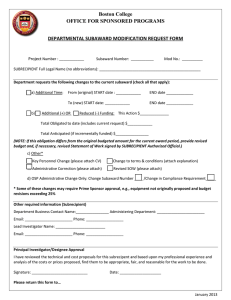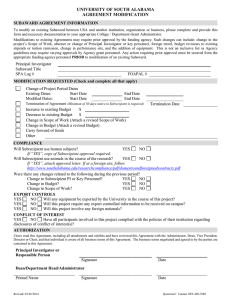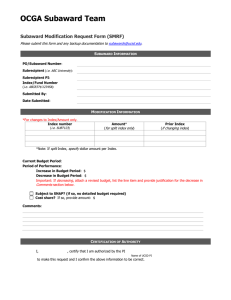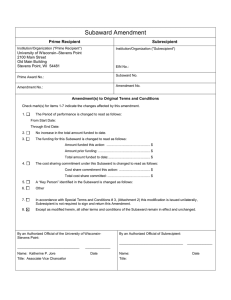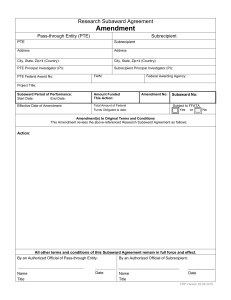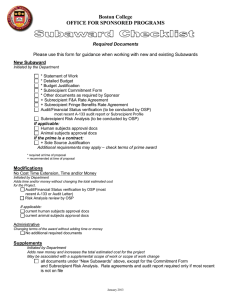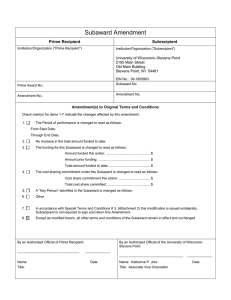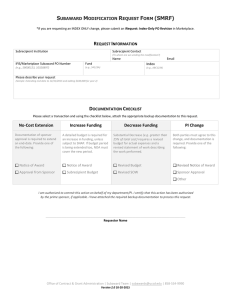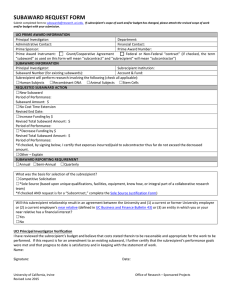Word doc)
advertisement
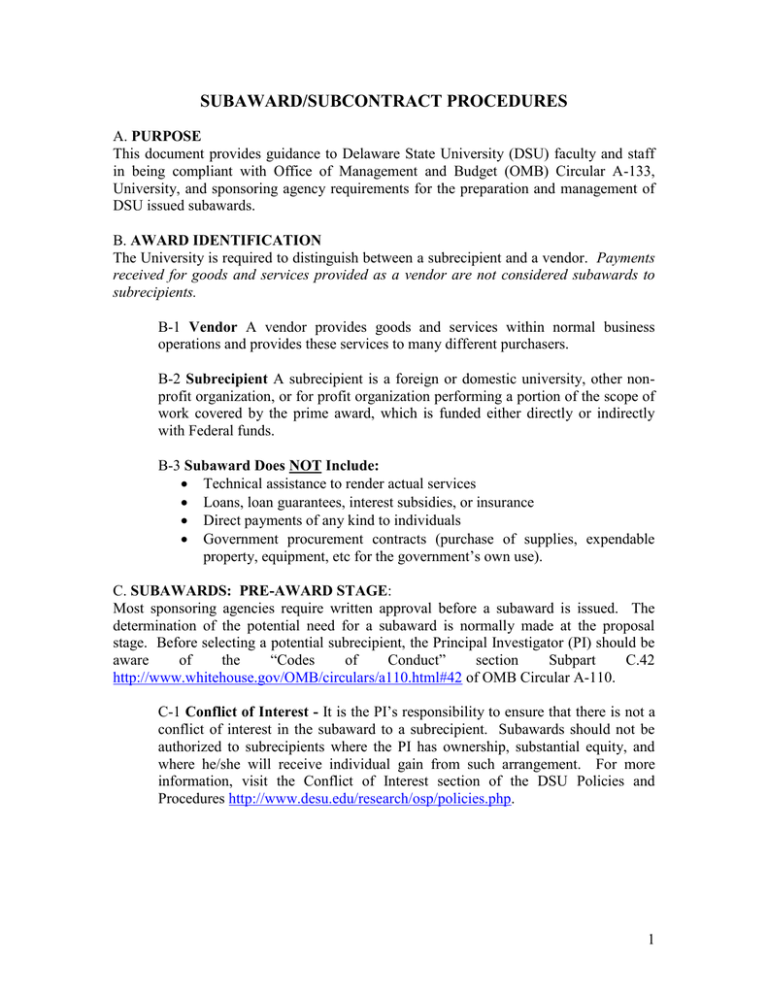
SUBAWARD/SUBCONTRACT PROCEDURES A. PURPOSE This document provides guidance to Delaware State University (DSU) faculty and staff in being compliant with Office of Management and Budget (OMB) Circular A-133, University, and sponsoring agency requirements for the preparation and management of DSU issued subawards. B. AWARD IDENTIFICATION The University is required to distinguish between a subrecipient and a vendor. Payments received for goods and services provided as a vendor are not considered subawards to subrecipients. B-1 Vendor A vendor provides goods and services within normal business operations and provides these services to many different purchasers. B-2 Subrecipient A subrecipient is a foreign or domestic university, other nonprofit organization, or for profit organization performing a portion of the scope of work covered by the prime award, which is funded either directly or indirectly with Federal funds. B-3 Subaward Does NOT Include: Technical assistance to render actual services Loans, loan guarantees, interest subsidies, or insurance Direct payments of any kind to individuals Government procurement contracts (purchase of supplies, expendable property, equipment, etc for the government’s own use). C. SUBAWARDS: PRE-AWARD STAGE: Most sponsoring agencies require written approval before a subaward is issued. The determination of the potential need for a subaward is normally made at the proposal stage. Before selecting a potential subrecipient, the Principal Investigator (PI) should be aware of the “Codes of Conduct” section Subpart C.42 http://www.whitehouse.gov/OMB/circulars/a110.html#42 of OMB Circular A-110. C-1 Conflict of Interest - It is the PI’s responsibility to ensure that there is not a conflict of interest in the subaward to a subrecipient. Subawards should not be authorized to subrecipients where the PI has ownership, substantial equity, and where he/she will receive individual gain from such arrangement. For more information, visit the Conflict of Interest section of the DSU Policies and Procedures http://www.desu.edu/research/osp/policies.php. 1 C-2 Subrecipient Proposal - The PI will obtain the following information from the subrecipient prior to the time of proposal submission with an Internal Processing Form (IPF) to the Office of Sponsored Programs (OSP): A scope of work completed by the subrecipient and agreed to by DSU’s PI. A detailed budget that meets the requirements of the sponsoring agency and DSU along with a budget narrative. Also an authorized official of the subrecipient institution must approve the budget. A subrecipient letter of support indicating commitment to perform the scope of work proposed, assuring the accuracy and reasonableness of the budget, and agreeing to enter into a subaward if the proposal is funded. To ensure timely processing of the proposal, the PI should request the subrecipient to submit their proposal to the PI five (5) working days before he/she is required to submit the DSU proposal to OSP. This gives the PI sufficient time to review the documents. C-3 Incorporating the Subrecipient Proposal into the DSU Proposal The DSU PI must incorporate the subrecipient proposal into the DSU proposal. When calculating the DSU’s F&A costs, exclude the portion of each subaward contained in the proposal, which exceeds $25,000 as required by OMB Circular A-21. F&A is calculated only on the first $25,000 of each separate subaward issued under any single prime award. Any waiver of F&A costs on a subaward requires prior approval of the Assistant Vice President and Director of OSP In order to allow adequate time for administrative review, please submit proposals that involve subawards to OSP five (5) working days prior to the sponsoring agency’s formal submission deadline. OSP reviews the DSU proposal and ensures that items discussed in the Subrecipient Proposal section above are included. It may be necessary to clarify costs or other items with the DSU PI or the subrecipient. D. SUBAWARDS: AWARD STAGE: Upon receipt of a fully executed prime award from the sponsoring agency, it is necessary to establish a subaward with the appropriate subrecipient. D-1 Purchase Requisition - The department will prepare a purchase requisition to encumber the funds. The purchase requisition and subsequent purchase order will go through the Banner approval process. D-2 Sub-Award Request Form - The subaward request form and the purchase order mentioned above, provide OSP with the necessary information needed to prepare the Subaward Agreement. Of primary importance is the scope of work, the budget that relates to the proposed effort, and any special conditions. The form should also include any other requirements that the subaward should 2 include. Some examples include copyright, publication, patent, equipment ownership requirements, and cost sharing. D-3 OSP Review - Upon receipt of the above-mentioned Sub-Award Request Form and Purchase Order, OSP must examine the following before preparing the Subaward Agreement: Subrecipient Qualifications - Subawards to ineligible organizations may lead to disallowance or other actions against DSU. “Flow-Down” - In preparing the subawards, it is important to “flowdown” to the subrecipient the special terms and conditions of the prime award, which both DSU and the subrecipient must comply. In rare instances, the sponsoring agency may wish to review the subaward. Assurances - In addition to “flow-down” terms, all required representations, certifications, and assurances of compliance (e.g., human subjects and animal use reviews) language must be included in the subaward documents. D-4 Special Considerations - Establishing subawards with other non-profit educational institutions are relatively straightforward. However, when dealing with foreign institutions, small business concerns, and commercial entities, other considerations must be addressed. Foreign Subrecipients - Significant challenges that arise with foreign subrecipients are ensuring the presence of the appropriate clauses in the subaward and that the foreign site is educated and fully understands its obligations. Especially under federal awards, there are a multitude of clauses that do not apply to foreign sites, but many still apply, and the prime recipient must flow them down and enforce them. Commercial Organizations - The issuance of subawards to commercial organizations will differ from the terms and conditions offered to nonprofit entities. It is important that the prime recipient ensure that the sponsoring agency has approved the collaboration, as there may be sponsoring agencies that are prohibited by their own requirements from funding for-profit entities. Small Business Subrecipients - Issues involved in subcontracting to small business often are a hybrid of the issues mentioned above. Small businesses may not be familiar with federal requirements and may require additional assistance. Small businesses may not have the cash reserves in order to initiate a project and may require advanced payments. Because they are commercial organizations, the same care should be taken to ensure that the appropriate cost principles and administrative requirements are specified when a federal sponsor is involved. Intellectual property agreements or negotiations may be protracted. D-5 Sub-award Agreement Preparation - After review, OSP will prepare the Subaward Agreement. OSP will send two (2) original copies of the Agreement to the subrecipient for review and signature by an authorized official. Subrecipients 3 are requested to keep one original copy of the signed subaward and the other is returned to OSP. Original subaward documents are kept in a prime award file located in the OSP. E. SUBAWARDS: POST-AWARD STAGE: After the subaward has been fully executed, OSP will forward a fully executed copy to the department with a Subcontract Checklist. E-1 Technical Monitoring - The DSU PI is responsible for monitoring the activities of subrecipients to ensure that they are complying with the terms of the Subaward Agreement. Progress reports should be reviewed by the DSU PI and discussed with the subrecipient as needed. Progress reports are usually incorporated into the overall progress report submitted by DSU to the sponsoring agency. Please see the Principal Investigator Handbook on obligations of the PI pertaining to the conduct of research, supported by grants, contracts, and cooperative agreements. E-2 Fiscal Monitoring - Subrecipients send their invoices for payment to the PI’s departmental administrator. The PI is responsible for approving all invoices with regard to the subrecipient’s performance and compliance as listed in the Technical Monitoring section above. The PI must sign the invoice before it will be processed. A PI cannot appoint a designee to sign the invoices in his/her absence. The signature of the PI on the invoice indicates that the invoice has been reviewed and the payment requested is appropriate. The invoice is then forwarded to Accounts Payable for processing. Accounts Payable will not pay the invoice without the PI’s signature. E-3 A-133/Other Monitoring - As a prime recipient and a pass through entity of Federal awards, Delaware State University through OSP is required to monitor the activities of subrecipients to ensure that their portions of research are in compliance with laws, OMB Circular A-133 audit regulations, and the provisions of awards or subawards; and that project costs incurred by the subrecipients are reasonable and allowable. Subrecipient monitoring starts at the beginning of the life of the subaward. E-4 Sub-award Modifications - Should it be determined during the life of the prime award that additional effort is required to be performed by the subrecipient, a request to issue a modification should be sent to OSP. The request should include the subaward number, name of the subrecipient, and the necessary information required to prepare the modification, such as extending time, additional funding, etc. OSP will then prepare the modification to the subaward agreement. 4 E-5 Close-Out Procedures - Before a subaward can be closed out, OSP will: Require the subrecipient and the PI to sign a certification indicating the subaward has been billed in full and all provisions of the Subaward Agreement have been fulfilled. Review the subaward to ensure that all provisions have been met and all required reports have been submitted. Finalize any disposition of equipment. A determination must be made on whether equipment purchased under the subaward agreement should remain with the subrecipient, or if title should pass to DSU. F. SOURCES OF FEDERAL GUIDELINES: F-1 OMB Circular A-21 - “Cost Principles for Educational Institutions” http://www.whitehouse.gov/omb/circulars/a021/a021.html F-2 OMB Circular A-133 - “Audits of States, Local Governments, and Non-Profit Organizations” http://www.whitehouse.gov/omb/circulars/a133/a133.html F-3 OMB Circular A-110 - Uniform Administrative Requirements for Grants and Agreements with Institutions of Higher Education, Hospitals, and Other NonProfit Organizations” http://www.whitehouse.gov/omb/circulars/a110/a110.html F-4 Federal Acquisition Regulations - http://farsite.hill.af.mil/ 5
